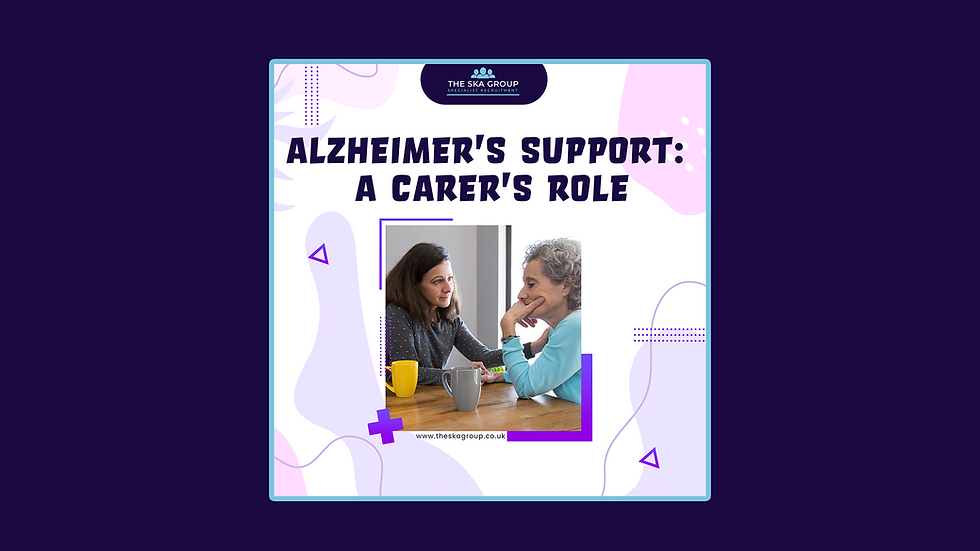National Schizophrenia Awareness Day
- Emily

- Jul 25, 2025
- 4 min read
Every year on July 25th, National Schizophrenia Awareness Day brings essential attention to one of the most misunderstood and misrepresented mental health conditions in the world.
Although schizophrenia affects approximately 1 in 100 people, myths and stigma still surround it - often causing isolation, discrimination, and delayed access to the support people need.
This year, as part of National Schizophrenia Awareness Day 2025, the message is clear: It’s time to challenge misconceptions, elevate real stories, and offer support rooted in compassion, not fear.
💭 What Is Schizophrenia?
Schizophrenia is a long-term mental health condition that affects the way a person thinks, feels, and relates to the world around them. It doesn’t mean a person has a split personality, nor does it automatically make someone dangerous - these are common misconceptions that fuel stigma.
The condition typically appears in late teens to early adulthood and is characterised by:
Hallucinations – Seeing or hearing things that others don’t
Delusions – Strongly held beliefs that are not based in reality
Disorganised thinking and speech
Lack of motivation or emotional expression
While schizophrenia is a serious condition, many people manage their symptoms well with the right treatment, support, and community understanding.
🔍 Common Misconceptions — And the Truth
Misinformation fuels stigma, and stigma creates barriers. Let’s tackle some of the biggest myths:
❌ MYTH: People with schizophrenia are violent.
✅ FACT: Most individuals with schizophrenia are not violent. In fact, they are more likely to be victims of violence than perpetrators.
❌ MYTH: Schizophrenia can’t be treated.
✅ FACT: With the right combination of medication, therapy, and support, many people with schizophrenia lead stable, fulfilling lives.
❌ MYTH: People with schizophrenia can’t work or live independently.
✅ FACT: Many individuals work, study, maintain relationships, and contribute meaningfully to society.
By challenging these myths, we make space for understanding - and for the voices that too often go unheard.
🧠 What Causes Schizophrenia?
While the exact cause is unknown, research suggests schizophrenia may result from a combination of:
Genetic vulnerability
Chemical imbalances in the brain
Environmental stressors
Traumatic experiences
It’s important to note that no one chooses schizophrenia. It’s a health condition like any other - and deserves to be treated with the same compassion and care.
💡 The Importance of Early Intervention
Like many mental health conditions, early intervention can make a significant difference in outcomes. Recognising early signs - such as social withdrawal, unusual thinking patterns, or a decline in self-care - and seeking professional help can lead to better management and support.
Access to services, especially in the early stages, helps reduce the severity of symptoms and improves long-term recovery potential.
❤️ Supporting Someone with Schizophrenia
Being there for someone living with schizophrenia takes understanding, patience, and compassion.
Whether you’re a carer, friend, family member, or support worker, here are some key ways you can help:
1. Educate Yourself
Understanding the condition helps you support your loved one better. There are many trustworthy sources of information, including NHS, Mind, and Rethink Mental Illness.
2. Practice Non-Judgmental Listening
Sometimes, being present and listening without trying to correct or challenge is the most powerful form of support.
3. Respect Boundaries and Choices
People with schizophrenia should be empowered to make their own choices where possible. Autonomy plays a major role in recovery and dignity.
4. Help Build Routines
Consistent daily routines around meals, rest, and medication can reduce stress and support stability.
5. Encourage Professional Help
Support them in accessing care, attending appointments, or speaking to a GP or mental health service.
6. Look After Yourself Too
Carers and supporters must care for their own mental health too. Peer support groups, respite care, and open conversations can help.
🗣️ Lived Experience: Listening to Real Voices
Too often, people with schizophrenia are spoken about rather than spoken to. One of the most powerful tools for awareness is hearing directly from those with lived experience.
Some themes from these voices include:
The frustration of being misunderstood
The relief of a correct diagnosis and good care
The power of meaningful relationships and independence
The need for inclusion in education, employment, and community life
When we amplify these voices, we remind the world: people with schizophrenia are not defined by their diagnosis - they are individuals with hopes, talents, and rights.
🛠️ Treatment and Recovery
Treatment plans are as unique as the people who live with schizophrenia.
They may include:
Antipsychotic medications to manage symptoms
Psychological therapies such as CBT (Cognitive Behavioural Therapy)
Peer support and community groups
Supported employment or housing
Lifestyle interventions - nutrition, exercise, and stress management
Recovery isn’t always linear - there may be ups and downs. But with sustained, personalised care, living well with schizophrenia is absolutely possible.
🌍 A More Inclusive Future
As we look ahead, awareness alone is not enough. We must also take action:
Advocate for better funding for mental health services
Create inclusive workplaces and social spaces
Offer compassionate care that prioritises dignity and agency
Ensure the media represents schizophrenia responsibly
Real change happens when communities choose understanding over judgment, and support over silence.
📣 National Schizophrenia Awareness Day 2025
This July 25th, let’s not just wear a ribbon - let’s listen, learn, and lead with empathy.
Let’s stand beside the individuals living with schizophrenia and the people who support them - not out of pity, but with respect.
Behind every diagnosis is a person. Behind every statistic, a story. And behind every act of care, the chance to change someone’s life.




Comments